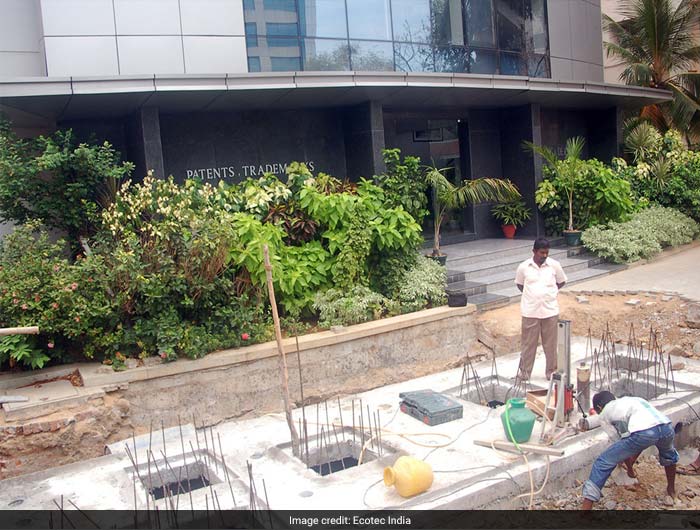Highlights
- Households in Tamil Nadu's Muttukadu have wastewater treatment systems
- The system uses natural bacteria and microorganisms to treat wastewater
- A single system can treat up to 3,600 litres per day
In Tamil Nadu’s Muttukadu, the rows of small but aesthetically designed houses are a fresh welcome to one’s eyes from the concrete buildings of the city. Well-known for its water sport facility, which is a common weekend getaway for many in Chennai as its right outside the city, approximately 100 houses in this town have adopted a unique method to ensure that the wastewater produced by the households is properly treated, not at some treatment plant far away, but within the households itself. While wastewater treatment might sound like an expensive process requiring high technological expertise, homes in this tiny town have shown that it could also be achieved domestically with moderate expenditure.
The technology employed to build the septic tank which treats wastewater is German made and comes with an added advantage of not emitting foul stenches during the treatment of wastewater. The design used to treat the wastewater is modeled after a technology named Sequencing Batch Reactor (SBR) method, which helps in achieving 98 per cent purification within six hours, without using any chemicals.
But how did the houses in Muttukadu begin their journey of treating wastewater at home?
Our town was never water scarce and that was the reason why we would use water lavishly. But in 2012, there was severe water crisis across Chennai as tanks ran dry and our town was affected too. It was then when we decided that if our wastewater could be reused for purposes like gardening and using it in toilets, a lot of freshwater could be saved. It was also during this time that I read up on German technology that could be used to recycle wastewater at home, said Suman Nagarajan, one of the the first residents in Muttukadu to install a wastewater treatment system at home.
The technology, named Klaro, is a German innovation which attempts to provide treatment of wastewater at households, and at an affordable cost. The system comprises a tank and two chambers, which are collectively used to store and discharge the wastewater post treatment. At first, the wastewater is channelised towards the wastewater collection tank. All the wastewater from the household is channelised into the tank via multiple pipelines. The tank in which the water is collected uses aeration, sedimentation and gravity to separate waste particles of different densities. Of these operations, aeration is the most important as it creates a suitable atmosphere for natural bacteria to thrive in and digest much of the waste in the water.
What attracted me most about this technology was its dependence on natural bacteria instead of chemical treatment of water. Also, the system does not require much space as the whole system consists of a tank and two chambers only, said Mr. Nagarajan.
Once the aeration of the wastewater is completed, it is discharged into the chambers where the SBR process takes place, using numerous microorganisms to treat the water thoroughly. After treating the wastewater for nearly six hours, it becomes usable for various purposes. At Nagarajan’s home, the wastewater is used to water plants in his garden. Since the installation of the wastewater treatment system in the households of Muttukadu, freshwater usage has come down by 12 to 15 litres in each household per day, which approximately equals to 360 to 450 litres less freshwater consumption in the town, in a month.
When I had installed the system in 2013, people asked me what the need to recycle wastewater is and what if I accidentally consume wastewater. I guess all their fears have been put to rest as nearly all households in Muttukadu have installed the system in the last 4 years and effectively using wastewater for various purposes, said Mr. Nagarajan.
The Klaro system costs Rs. 70,000 to setup and is a one-time investment only, sufficient to treat up to 3,600 litres a day. The system uses minimal electricity to operate, approximately 8 watts, equal to that of a lightbulb. The system can also be implemented in residential societies, offices, colleges and hospitals, though the setup costs can vary depending upon the size of the place as well as the capacity of wastewater to be treated. Considering that the setting up cost is a one-time investment, the system is highly beneficial as it ensures cost savings on freshwater consumption and helps restrict the use of depleting freshwater to essential needs. Since the wastewater treatment systems were installed, every household saved 12 to 15 litres of freshwater every day, which translates approximately 360 to 450 litres for each household, per month.
Muttukadu could be a leading example across all urban towns in India where use of freshwater is still at large, even for purposes other than consumption and sanitation. Nearly 76 million people in India do not have access to safe drinking water and the deficit could only be subsided when dependence on freshwater is reduced. Large scale implementation of home based wastewater treatment can ensure that wastewater generated from urban households is neither wasted, nor discharged into rivers, untreated.































